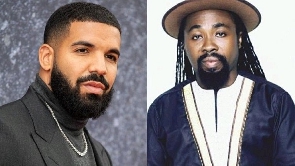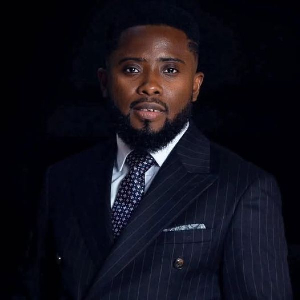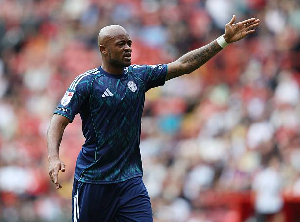It would not surprise me if I were labeled a 'snitch' for writing this article.
That's not too far from the truth, as I've been taught to be fearless in the face of the truth, even if it results in retaliation or harsh descriptions.
On April 22, 2023 edition of Say it Loud on Joy FM's Showbiz A-Z, I expressed my enthusiasm regarding Ghanaian rapper, Obrafour's copyright infringement lawsuit against Canadian rapper, Drake. I also discussed why the case portends future copyright lawsuits against Ghanaian musicians.
In a system where many individuals are either oblivious of copyright laws or have no regard for them, it is heartening to see cases such as this arise.
Creatives are given optimism by intellectual property laws, which regulate the creative economy. Even seventy years after an artist's demise, the laws provide a system to support the artist's family.
In 1990, after Paul Simon had used Ghana's Yaa Amponsah guitar pattern in his composition Spirit Voices, he paid USD 16,000 in royalties to Ghana's Copyright Administration.
In June 2015, Rex Omar sued Joy Industries Limited for copyright infringement after the company used his song 'Dada Di Da' without his permission to promote their product Joy Dadi Bitters. He was awarded GH 200,000 for damages in the case.
In July 2016, hiplife musician Tic Tac sued Melcom for continuing to use his image in product advertisements after their contract had expired. In this case, he was awarded $300,000 for damages.
These examples serve as excellent test cases for the industry. They give the average creative at least one reason to beam. The knowledge that there are laws protecting one's talent guarantees a brighter future.
Why does Obrafour sue Drake?
Drake, a prominent Canadian rapper, sampled Obrafour's 2003 remix of Oye Ohene for his song 'Calling My Name', which was released on June 17, 2022, from the album 'Honestly, Nevermind!' Obrafour filed a suit against Drake on Tuesday, April 18, 2023.
In the writ presented to a New York court, Obrafour claimed that Drake violated his intellectual property by sampling a portion of his composition without permission.
"The Obrafour-Drake case should terrify Ghanaian music pirates", according to Kwame Dadzie.
"Defendants released the Infringing Work on June 17, 2022, despite the fact that an agent of one or more Defendants had previously contacted Obrafour seeking permission to use the Copyrighted Work in the Infringing Work."
"Obrafour never granted Defendants permission to use the Copyrighted Work, and the Infringing work was released mere days later," the document states in part.
Indicating that Drake and the other defendants reaped enormous benefits from 'Calling My Name', Obrafour seeks damages of at least $10,000,000.
At 0:53 of Drake's song, the "Killer cut, blood, killer cut" refrain originally spoken by Mantse Aryeequaye for Obrafour's 2003 Oye Ohene remix can be heard.
Why Ghanaian creators must be aware of copyright regulations
It is unfortunate that the majority of musicians and creatives in Ghana are oblivious of their industry's systems and structures. Many of them know nothing about intellectual property laws, and it's unfortunate that they refuse to learn. The majority of these artists only desire fame, wealth, and the other perks that come with it.
Even in modern times, when information on a variety of topics is as close as a mobile phone, many creatives continue to make the same errors as their predecessors. Knowledge of intellectual property laws precludes the exploitation of creative individuals. It gives them the confidence and ability to negotiate for their rights when others use their works. Aside from that, gaining a fundamental understanding of intellectual property laws prevents one from violating the rights of others.
A significant number of Ghanaian musicians have sampled compositions from other musicians without permission.
The Library by Andy Dosty, which airs on Hitz FM, has truly opened the eyes of music enthusiasts. Many of the hits published by Ghanaian musicians in the past illegally sampled the work of foreign musicians. This practice dates back to the time of Nana Kwame Ampadu. Even gospel musicians stole from musicians from other countries. Perhaps they lacked knowledge of the law at the time, and information flow was also restricted. It is possible that the genuine owners of these songs have never heard the Ghanaian versions.
However, the new generation of musicians cannot navigate the same treacherous terrain. The copyright lasso is poised to capture any available Ghanaian musician.
When a Ghanaian musician uses another's song without permission and it is brought out, the media is frequently criticized for doing its job.
This lawsuit between Obrafour and Drake should serve as an important lesson for all Ghanaian musicians. As pleased as we are that one of our own may be raking in cash from Drake's account, we should avoid using other people's compositions without permission.
Our Ghanaian music thieves must cease their reckless sampling of tunes.
Opinions of Wednesday, 26 April 2023
Columnist: Realest news Gh















